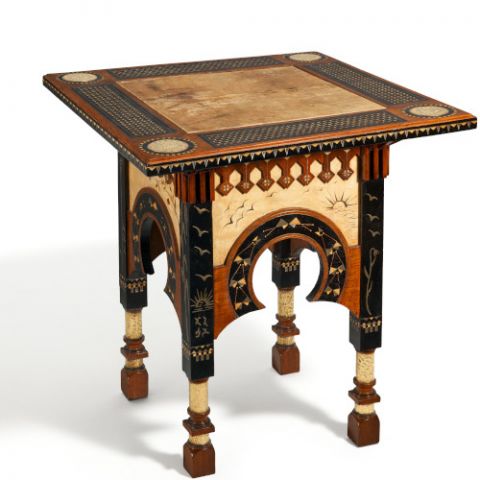
Lot was sold
Lot 90 | Porcelain hunting ensemble with hound pack and deer
Estimate
1.000
- 1.200
€
D
Result:
(incl. premium)
1.056 €
PORCELAIN HUNTING ENSEMBLE WITH HOUND PACK AND DEER.
Meissen.
Date: 20th century.
Maker/Designer: Model J.J. Kaendler.
Technique: Porcelain, enriched in colours and gold.
Measurement: Height 12,5cm.
Mark: Swordsmark, 63048.
Hunting porcelain
Collecting porcelain was a passion of the Saxon Elector Augustus the Strong. Hunting was the undisputed obsession of his son August III. So it was only a matter of time before these two important elements of ostentatious court life met.
In the days of absolutism, hunting was a privilege of the nobility. Like collecting and presenting porcelain, it was an important act of representation with which guests were entertained during courtly festivities.
In Saxony, the cradle of European porcelain, hunting was an important aspect of court ceremonial and a great deal of effort and money was invested in its practice. This was particularly true during the reign of August III, under whom Hubertusburg Palace, one of several pleasure palaces of the electors, was extended to become the largest hunting lodge in Europe. The various forms of hunting, such as combat hunts, falconry, stalking, pheasant shooting or the French par force hunt, provided a large number of pictorial models for the increasingly popular porcelains with hunting subjects. The detailed figures and depictions often tread a fine line between historical testimony to courtly customs and charmingly dramatised cock-and-bull stories. The porcelains were used to decorate hunting lodges, as table ornaments for dinners following hunting events or as representative gifts. In addition to smaller tea, coffee and chocolate services, large dining services and magnificent mantelpieces and vase sets, a large number of figurative porcelains were designed. Huntsmen and women with weapons, on horseback, with the hunting horn or with their hounds and the hunted prey were to be found on the dining tables in the company of naturalistic animal sculptures. On the hunting table of Count Brühl, Electoral Saxon and Royal Polish Prime Minister, it is said that it was even possible to set up the course of a par force hunt completely in porcelain.
Meissen.
Date: 20th century.
Maker/Designer: Model J.J. Kaendler.
Technique: Porcelain, enriched in colours and gold.
Measurement: Height 12,5cm.
Mark: Swordsmark, 63048.
Hunting porcelain
Collecting porcelain was a passion of the Saxon Elector Augustus the Strong. Hunting was the undisputed obsession of his son August III. So it was only a matter of time before these two important elements of ostentatious court life met.
In the days of absolutism, hunting was a privilege of the nobility. Like collecting and presenting porcelain, it was an important act of representation with which guests were entertained during courtly festivities.
In Saxony, the cradle of European porcelain, hunting was an important aspect of court ceremonial and a great deal of effort and money was invested in its practice. This was particularly true during the reign of August III, under whom Hubertusburg Palace, one of several pleasure palaces of the electors, was extended to become the largest hunting lodge in Europe. The various forms of hunting, such as combat hunts, falconry, stalking, pheasant shooting or the French par force hunt, provided a large number of pictorial models for the increasingly popular porcelains with hunting subjects. The detailed figures and depictions often tread a fine line between historical testimony to courtly customs and charmingly dramatised cock-and-bull stories. The porcelains were used to decorate hunting lodges, as table ornaments for dinners following hunting events or as representative gifts. In addition to smaller tea, coffee and chocolate services, large dining services and magnificent mantelpieces and vase sets, a large number of figurative porcelains were designed. Huntsmen and women with weapons, on horseback, with the hunting horn or with their hounds and the hunted prey were to be found on the dining tables in the company of naturalistic animal sculptures. On the hunting table of Count Brühl, Electoral Saxon and Royal Polish Prime Minister, it is said that it was even possible to set up the course of a par force hunt completely in porcelain.
Contact:
Print this lot | Recommend lot |
Conditions of this Lot
VAT margin scheme, VAT included, but must not be indicated, not refundable
32% buyer’s premium on the hammer price
32% buyer’s premium on the hammer price
Estimated shipping costs for this lot:
Germany: 15,97 Euro plus 3,03 Euro VAT
EU: 26,89 Euro plus 5,11 Euro VAT
Worldwide: 50,42 Euro plus 9,58 Euro VAT
additional shipping insurance
Similar works in the auction
Meissen Germany Porcelain 20th century Ensemble Kaendler, Johann Joachim
Meissen Germany Porcelain 20th century Ensemble Kaendler, Johann Joachim
Stock Id: 70233-58
More lots which could be of your interest
- Estimate: 2.000 - 3.000 €
15.05.2025 - ca.12:15













